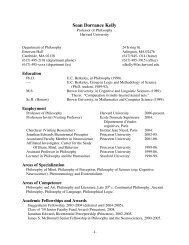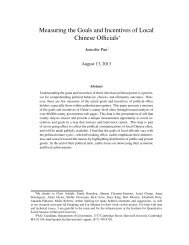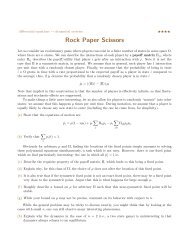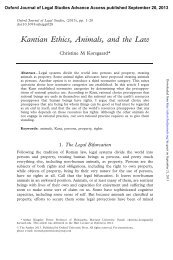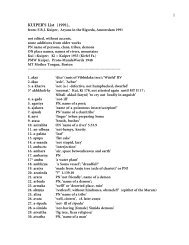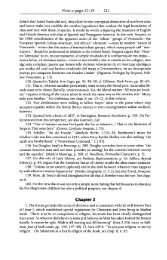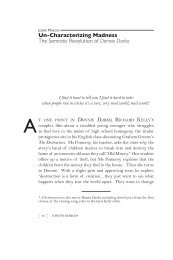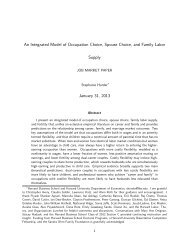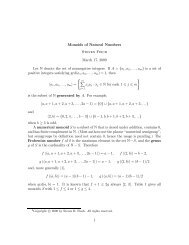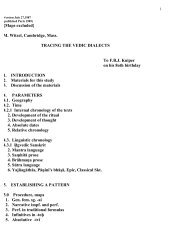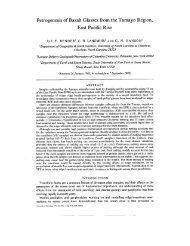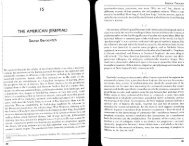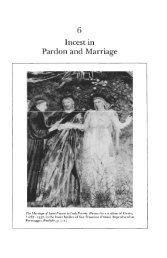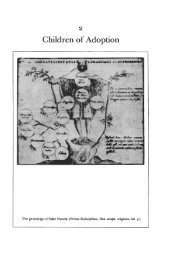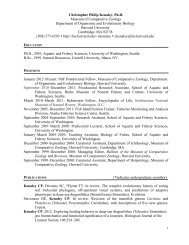references - people.fas.harvard.edu - Harvard University
references - people.fas.harvard.edu - Harvard University
references - people.fas.harvard.edu - Harvard University
Create successful ePaper yourself
Turn your PDF publications into a flip-book with our unique Google optimized e-Paper software.
Jewish home. One must remember that his great-aunt<br />
Sarah Itzig Levy (1761-1854) had been a patron of<br />
Bach’s sons Wilhelm Friedemann (1710-84) and Carl<br />
Philipp Emanuel (1714-88); nor must one forget that<br />
it was his grandmother Bella Salomon, an Orthodox<br />
Jew, who had given Felix a copy of the score of Sebastian<br />
Bach’s St. Matthew Passion as a present for<br />
his fi fteenth birthday in 1824; she would pass away<br />
a month later. This score became, to quote the distinguished<br />
Mendelssohn scholar R. Larry Todd, “the<br />
cornerstone of his musical faith,” 43 rather than the<br />
cornerstone of his religious faith. By extension, it is<br />
inconceivable that such a brilliant young man, raised<br />
in this environment, and knowing his grandmother’s<br />
hostility toward conversion, could have remained<br />
unaware that Jewish law (Halakhah) does not recognize<br />
conversion. Nor, given the quality and intensity<br />
of his home-schooled <strong>edu</strong>cation, and his intellectual<br />
curiosity, could he have remained unaware of Luther’s<br />
rabid anti-Semitism and remained indifferent<br />
to its legacy or to Luther himself. Nor was he naive<br />
enough to disregard the fragility of German-Jewish<br />
relations or to ignore positive developments for Jews<br />
in England. Felix’s mindful attention, in 1833, to the<br />
simultaneity of the British Parliamentary debates to<br />
grant Jews the right to vote and to hold offi ce, just<br />
as the Prussian monarch had begun dismantling civil<br />
rights statutes for Jews in the German Duchy of<br />
Posen, is noteworthy: Professor Todd has suggested<br />
that Felix’s comments on these events—Das amusirt<br />
mich prächtig (“This greatly amuses me”)—refl ect<br />
those of a “detached spectator.” 44 I respectfully disagree<br />
with Professor Todd’s understated translation<br />
of prächtig which, in fact, attaches itself to effusive<br />
adverbs such as “marvelously.” The tone of Mendelssohn’s<br />
writing can well be interpreted as cynical<br />
hyperbole grounded in irony, resignation, even disgust,<br />
rather than of dispassion or actual amusement.<br />
My translation, in contemporary vernacular, would<br />
be “This is really over-the-top!” or “This is ridiculous!”,<br />
or “This is hilarious!” Unquestionably fearful<br />
for his own family’s safety and well-being, Mendels-<br />
43 R. Larry Todd, A Life in Music, Oxford <strong>University</strong><br />
Press: New York and Oxford: 2003, 123-124.<br />
44 Ibid., 283.<br />
ces papers - open forum # 6, 2011<br />
sohn followed these developments not as a Christian<br />
but as a Jew. And, at his death, Felix joined his parents<br />
in a section of Berlin’s Dreifaltigkeitsfriedhof reserved<br />
for converted Jews, the Neuchristen. This, and<br />
this alone substantiates his understanding—and that<br />
of upper-class Jews living in Germany—of how German<br />
Christians perceived even privileged, converted<br />
Jews: as outsiders. 45<br />
When, over a century later, the German musicologist<br />
Carl Dahlhaus (1928-89) bequeathed his<br />
concept Das Problem Mendelssohn, he bequeathed<br />
nothing more than a colossal pseudo-intellectual abstraction,<br />
if not obstruction, or infection to proper<br />
and dignifi ed Mendelssohn scholarship. To wit: has<br />
any other composer’s circumcision ever come under<br />
scrutiny? Das Problem Wagner, even Das Problem<br />
Irgendwem (“Whoever”) would have been a more<br />
plausible quest for the problem-hungry Dahlhaus. 46<br />
One is compelled to query why, indeed, Dahlhaus’s<br />
problem was Mendelssohn and not Wagner… For if<br />
one must concede to the existence of a “problem”<br />
surrounding Felix Mendelssohn and his family, the<br />
essential “problem” was and remains for Wagner and<br />
his kind, the indestructibility of Judaism—the very<br />
foundation of Christianity—as the governing matrix<br />
behind the metaphoric, analytical framework constructed<br />
around them. To quote Michael Steinberg:<br />
The so-called “Mendelssohn problem,”<br />
as we know, originates with<br />
Wagner and stands at the source of a<br />
powerful trope in which Jewishness,<br />
femininity, and the inability to create<br />
become shared indicators of cultural<br />
weakness, danger, and pollution. Internally<br />
[my emphasis], there is no<br />
Mendelssohn problem, just as there is<br />
45 See Langton, 3-4.<br />
46 Das Problem Mendelssohn. Regensburg: Bosse, 1974.<br />
See also Eric Werner, “Das Problem Mendelssohn by Carl<br />
Dahlhaus,” in Notes, Second Series, Vol. 33, No. 2 (December,<br />
1976): 281-284; and Albrecht Riethmüller, “Das<br />
Problem Mendelssohn,” in Archiv für Musikwissenschaft, 59/3<br />
(2002): 210-221. Stuttgart: Franz Steiner Verlag, 2002.<br />
17



